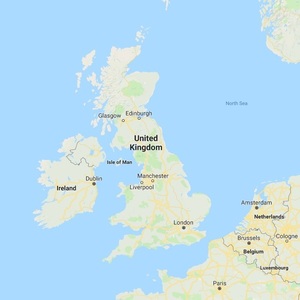UK sets 10% SAF goal, launches £165 Advanced Fuels Fund

SOURCE: Google Maps
July 19, 2022
BY Erin Krueger
The U.K. government on July 19 released its Jet Zero strategy. The initiative, in part, requires at least 10 percent sustainable aviation fuel (SAF) use by 2030. It also aims to kickstart a domestic SAF industry, supported by a new £165 million ($197.91 million) Advanced Fuels Fund.
The Jet Zero strategy more broadly commits U.K. domestic aviation to achieving net zero emissions by 2040. All airports in England must also be zero-emission by 2040.
Advertisement
Advertisement
The strategy includes six main priority areas. In addition to the SAF goals, the strategy also aims to improve the efficiency of the existing aviation system; support the development of zero-emission aircraft; support the development of carbon markets and greenhouse gas (GHG) removal technologies drive decarbonization and offset any residual emissions; provide consumers with better information so they can make sustainable aviation choices; and increase the understanding of non-CO2 impacts of aviation, such as contrails and nitrogen oxides.
The new Jet Zero strategy builds on the U.K.’s Net Zero strategy, an economy-wide plan that aims to achieve net-zero emissions by 2050, and the U.K.’s transport decarbonization plan, which outlines commitments and actions needed to decarbonize the transport system.
The newly launched Advanced Fuels Fund supports a goal to have at least five commercial SAF plants under construction in the U.K. by 2025. The fund will provide grants funding to first-of-kind commercial and demonstration-scale projects in the U.K. at all development stages. According to the government, £22 million of the £165 in funding will be reserved to support projects that use CO2 as their main carbon source in fuel production. Applications for the first round of funding must be submitted by Sept. 14. A second round of funding is scheduled to open in June 2023.
Advertisement
Advertisement
Related Stories
The U.S. Department of Energy’s Office of Energy Efficiency and Renewable Energy is soliciting public comments on a preliminary plan for determining provisional emissions rates (PER) for the purposes of the 45Z clean fuel production credit.
On July 17, Iowa’s cost-share Renewable Fuels Infrastructure Program awarded $1.12 million in grants for 20 applicants to add B11 and 4 applicants to add E15 to retail sites. This was the first meeting following the start of RFIP’s fiscal year.
Par Pacific Holdings Inc., Mitsubishi Corp. and ENEOS Corp. on July 21 announced the signing of definitive agreements to establish Hawaii Renewables LLC, a joint venture to produce renewable fuels at Par Pacific’s refinery in Kapolei Hawaii.
A new study published by the ABFA finds that the U.S. EPA’s proposal to cut the RIN by 50% for fuels made from foreign feedstocks, as part of its 2026 and 2027 RVOs, could stall the growth of the biomass-based diesel (BBD) industry.
Reps. Mike Flood, R-Neb., and Troy A. Carter, Sr., D-La., on July 21 reintroduced the SAF Information Act. The bill directs the U.S. EIA to more explicitly include SAF data in its weekly and monthly reports.
Upcoming Events










